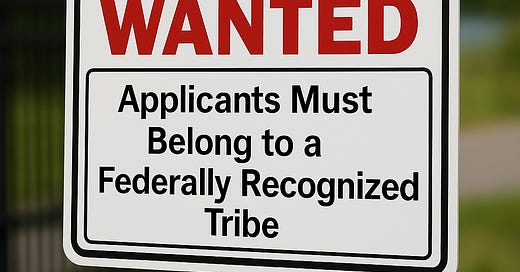Crabs don't discriminate
Hiring crab hunters based on ancestry, not ability
In a county fighting both poverty and invasive species, one job excluded many potential applicants when a federally funded role to combat the European Green Crab was open only to tribal members, shutting out qualified locals. In a place where jobs are scarce and ecosystems are fragile, should saving our shores depend on your heritage—or your dedication?
Clallam County is one of the most economically depressed regions in the United States. In a place where opportunity is scarce and wages are often low, each job posting matters—especially when it involves vital work like protecting our coastal environment.
Last month, an important position closed: “European Green Crab Technician.” This wasn’t just another government gig—it was part of a broader effort to stop the spread of one of the most invasive species threatening Washington’s fragile marine ecosystems. The Jamestown S’Klallam Tribe, in partnership with the nonprofit Conservation Legacy, took the lead on this front. This noble work is exactly the kind of hands-on, conservation-focused role that should unite the community.
But there was a catch. While no experience was required, your race was.
Right there under “Eligibility,” the job posting made it clear: applicants had to be enrolled in a federally recognized Tribe, Band, or Village. The message was unmistakable. You could be the most qualified, most passionate, most experienced green crab eradicator in the country—but if your DNA didn’t meet the criteria, you weren’t eligible.
Let that sink in: In a community facing a housing crisis and striving to create living-wage jobs, a taxpayer-funded position designed to safeguard our natural heritage, and a job that included housing, was made inaccessible to the public—not due to merit or ability, but because of ancestry.
And yes, you helped pay for it. The program was funded through AmeriCorps, which receives its money from the federal government. If you pay federal taxes, you helped fund a job that perhaps you—and many of your neighbors—were barred from applying to.
The irony is thick. In the job posting, the Jamestown Tribe said it valued “collaboration, data-driven decision-making, and integrity, fostering transparent, effective conservation efforts.” And yet, this same conservation program operated under a closed-door standard—one that excluded willing, qualified citizens from helping protect our shores.
This isn't about resentment. It's about equality. About asking whether, in a county with some of the highest poverty rates in the state, we should be closing environmental jobs to anyone who doesn’t meet a narrow racial definition. It’s about whether stopping the spread of an invasive species—something that affects all of us—is more important than enforcing a hiring policy that would reject even the most passionate, capable candidate simply because of their heritage.
Make no mistake: the European green crab is a serious threat. One that endangers native shellfish, eelgrass beds, and the broader balance of our marine environment. Every available hand, every bit of knowledge and dedication, should be welcomed in this fight. The priority should be the crab, not the color of the technician.
If this is the new standard for conservation hiring—where identity takes precedence over qualifications—then the concern isn’t just about preserving local species like the crabs. It’s about protecting the integrity of our public systems and ensuring that every resident of Clallam County, regardless of background, is treated fairly.
This shift in employment eligibility stems from the decision to transfer management of our National Wildlife Refuge to a sovereign tribal nation. Now, with County Commissioners considering a similar transfer of authority of our county parks, important questions remain: Who will be eligible to work there?
In a county where jobs are precious and the stakes are high, it’s time to get back to basics. Merit. Equality. Shared stewardship of our land and water. Because saving the ecosystem shouldn’t be exclusive.
Last Equitable Wednesday, subscribers were asked if they thought it's equitable to create positions or programs based on race or tribal affiliation using public and donor funds. Of 255 votes:
91% said, “No, that’s not equitable.”
4% said, “Yes, if it’s needed.”
5% said, “Maybe, it depends.
No one was unsure.






If any business put down specific races that they would only hire, God help you.
IP or Indian Preference is also a part of the IHS Indian Health Services hiring guidelines. It is a system that is not based on merit or best qualifications. Working in that type system for over 20 years, I personally observed how it fostered resentment and low performance output. What makes Native Americans a step above Non-Natives to qualify as "stewards" of OUR land and waters? I guess the County Commissioners know more than we do as they seem to lean in that direction...as we will see when they turn our county parks over to the authority of the Tribe and hiring will be under the IP system.